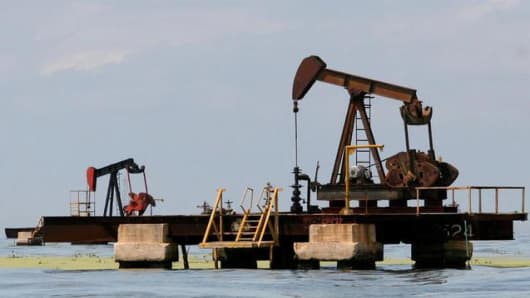OPEC ministers gathered in Vienna are inclined to keep supplies steady, but are on alert for signs record high oil and recession will erode demand.
The price of U.S. crude hit a record of $103.95 on Monday and was trading above $102 a barrel early on Tuesday.
OPEC ministers have said prices have been driven by factors beyond their control, such as a weak dollar and speculation, and not by any lack of oil.
President of the Organization of the Petroleum Exporting Countries Chakib Khelil said the group's two options at a meeting on Wednesday were to keep output steady or to reduce it.
"I don't think OPEC would consider increasing production because then we would be increasing to meet demand that doesn't exist," Khelil told reporters.
Ministers are expected to call another meeting soon and to keep monitoring the impact of a U.S.-led economic slowdown and a seasonal fall in oil consumption.
"The economic slowdown in the United States definitely has an effect on world economic growth, which will have an impact on world petroleum demand this year," Khelil said.
OPEC's most influential member Saudi Arabian Oil Minister Ali al-Naimi has made no public comment since his arrival in Vienna on Monday.
The group's second biggest producer Iran said before setting off from Tehran he would support a cut in output because the market is well-supplied.
But on arrival in Vienna, he refused to be drawn, saying only the OPEC meeting would consider all the factors that affect the market.
Libya's top oil official Shokri Ghanem said he was hopeful this week's meeting would be quick and unsurprising.
"It will be a quick meeting," Ghanem said. "There is always room for a surprise but we are trying to avoid surprises."
The group last meet on Feb. 1 when it decided to leave output unchanged.
It has not agreed a formal increase since September last year, although its output levels have changed slightly.
A Reuters survey found OPEC output fell slightly in February, the first decline since August last year. The group is still pumping 110,000 barrels per day above its agreed target.
Consumer countries, led by the United States, have urged OPEC to increase output to try to calm markets and to help stave off recession.
But analysts have agreed with OPEC ministers that pumping more oil would not help.
"I think for now it's much better for them to leave it unchanged, rather than trying to do something to try to influence the price when they know prices are not driven by fundamentals," said Olivier Jakob of Petromatrix.
The latest government data showed U.S. crude inventories had risen for a seventh week in a row, while gasoline stockpiles reached their highest for 14 years.


